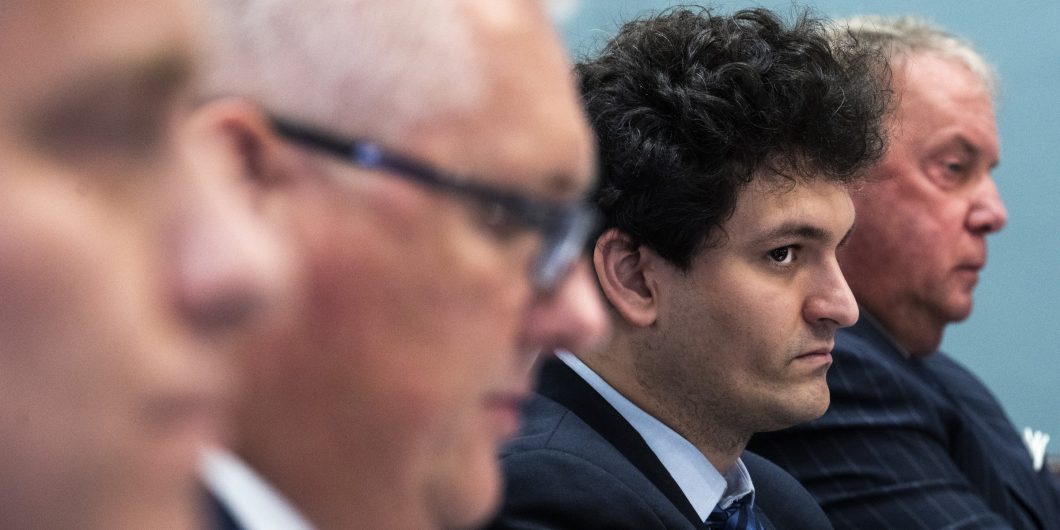FTX and the Lust for Wealth
Financial shenanigans are nothing new, but the celebrated Sam Bankman-Fried and his company, FTX, stand out from other major tricksters of the past generation such as Ken Lay and Jeff Skilling at Enron, Bernie Ebbers at WorldCom, and even the king of them all, Bernie Madoff. Bankman-Fried and FTX are distinctive by virtue of their close ties to the ethical movement known as effective altruism. Lay, Skilling, Ebbers, Madoff, and others offered no rationale for their hijinks beyond the lust for wealth, but Bankman-Fried made much, and ensured that much was made in the press, of his affiliation with effective altruism and its aim to “find ways of doing good that actually work.”
Once touted as the “wealthiest person in the world under age 30,” with a net worth purported to be as high as $26 billion, Bankman-Fried was born in 1992 on the campus of Stanford University, where both his parents are law school professors. In 2014, he graduated from the Massachusetts Institute of Technology with a degree in physics. It is said that while studying there, he met William MacAskill, Oxford prophet of effective philanthropy, who convinced him that instead of devoting his intellect to charitable activities, he should maximize his earning potential and donate the proceeds to ways of doing good that maximize efficacy. He even worked at the Center for Effective Altruism in 2017.
Bankman-Fried then founded two companies, Alameda Research, a trading firm, in 2017, and FTX, a cryptocurrency derivatives exchange, in 2019. FTX soon rose to national and international prominence through sponsorships and donations. For example, the Miami Heat basketball facility was renamed “FTX Arena,” and an agreement was struck to place FTX logos on the uniforms of Major League Baseball umpires and prominent Formula One racing teams. Bankman-Fried is said to have become the second-largest individual donor to both Joe Biden in the 2020 presidential campaign and Democratic candidates in the 2022 midterm elections.
The first half of November proved disastrous for Bankman-Fried and his companies. One of the largest cryptocurrency exchanges in the world revealed that it planned to sell its holdings of FTX’s cryptocurrency tokens. Soon thereafter it announced that a liquidity crisis had developed at FTX and that investors should expect “high volatility” in the company’s valuation. FTX shares began falling precipitously, Bankman-Fried lost his listing among the world’s billionaires, and reports appeared that FTX, the self-styled “cleanest brand in crypto,” had secretly transferred large amounts of money to Alameda Research. On November 11, Bankman-Fried resigned and the company went bankrupt, their fortunes wiped out.
The apparent contradictions between Bankman-Fried’s business activities and his adherence to the doctrines of effective altruism were paralleled by dramatic contrasts in his personal life. He lived in a gated community in the Bahamas, sharing with nine others a luxury penthouse worth a reported $40 million, and he and his parents and fellow FTX executives purchased Bahamian properties worth $120 million. He often supplied the press with evidence of his great wealth. Yet he routinely attended meetings with powerful business and political figures in t-shirts, shorts, and untied tennis shoes, drove a beat-up Toyota Corolla, and slept on the couches of friends. In short, his reputation for extreme wealth was amplified by his apparent indifference to it.
Bankman-Fried could also claim to be the world’s most prominent donor to effective altruism. In May, he spoke in Nassau at a conference co-sponsored by FTX and SALT, a convener of big thinkers. Sporting his trademark “Hanes special” and hosting dinners with the likes of Bill Clinton and Tony Blair, he championed the “earn to give” approach, telling attendees, “You can impact way more people through your philanthropy than you give back in your everyday life.” Throughout his rise to such wealth and power, Bankman-Fried presented his business activities as little more than a way to make as much money as possible so that he could give away as much as possible, in ways that would do the most good.
When people begin to regard making more money as the principal goal of their work life, even if they plan ultimately to dedicate it to philanthropic purposes, they start playing with fire.
The essential question is whether Bankman-Fried’s dedication to effective altruism and his financial misdeeds bear any causal relationship to one another. Some have suggested that his high-profile advocacy for this trendy school of giving was nothing more than a camouflage for greed, sowing doubt in the mind of his would-be critics. Others suggest that had his business empire remained intact, he would have made good on his promise to donate nearly all his wealth—tens of billions of dollars—to the worthiest of causes. While regarding both of these perspectives as too simplistic, we suspect that Bankman-Fried’s affinity for effective altruism’s tenets contributed to his fall.
For one thing, effective altruism’s “earn to give” mentality tends to foster dangerous habits. To be sure, the logic is, in a sense, unassailable. If a person who could devote her career to charity instead takes a for-profit job that brings in three times the income she could have earned in the non-profit sector, she can afford to fund two full-time charity workers and still support herself. In the case of Bankman-Fried, of course, this line of reasoning is amplified by multiple orders of magnitude, since he might have devoted billions to charity. Yet it would be foolish to assume that the kind of work persons do has no effect on their character or their aspirations in life.
In fact, every occupation tends to inculcate habits of perception, thought, feeling, and action. This is one reason that the professions have long made taking an oath a prerequisite to membership—for example, new lawyers and physicians swear to put the interests of their clients and patients above their own. When people begin to regard making more money as the principal goal of their work life, even if they plan ultimately to dedicate it to philanthropic purposes, they start playing with fire.
To Aristotle’s teaching that we tend to become what we habitually do we can add Augustine’s that we are shaped by our loves. No matter how sophisticated our utilitarian calculus, the things we pursue as means to some other end will, over time, tend to become ends in themselves, to the point that the means wind up supplanting the end. Just as those who enter politics to benefit the poor or address climate change may wind up, after they are in office, thinking only about how to win the next election, so people who spend their lives trying to make more money, for whatever purpose, will tend to find themselves caring more and more about wealth.
We must also draw an important distinction between making money and giving it away. Completing a master’s degree in business administration may enhance a person’s capacity to make money, but courses in marketing, finance, and strategic planning do not also necessarily contribute to excellence in giving it away. In the case of Bankman-Fried, it is likely that the strategies that initially enabled him to accumulate a large amount of wealth turned out to be philanthropically counterproductive. At the very least, his exploits have done far more harm than good to effective philanthropy and the hundreds of organizations and causes with which it is linked.
In the end, we need to focus more on who we are than what we have. If money were all that mattered, all that would be required to turn an ordinary person into a great philanthropist is to top up their net worth to the same level to the level of a Bill Gates or Mackenzie Scott. But perhaps even a virtue such as generosity is not so much a matter of money—the sums we enter on the amount lines of checks—as how inclined we are to recognize and respond to real opportunities to make a difference by giving the appropriate amount to the appropriate person at the appropriate time in the appropriate way and for the appropriate reason—in other words, to exemplify the virtue of generosity.
Here is where Bankman-Fried really falls short. He operates with a highly sophisticated utilitarian calculus powered by a keen mathematical mind, and he loves to deal with huge sums of cryptocurrency tokens, dollars, and life-years saved. Yet functioning at such a high level of abstraction, he fails to notice the faces and life stories of real human beings. He spends far more time thinking about and hence cares more for graphs, equations, and diagrams than he does any particular person. In his zeal to take things to the max he forgets that goodness always involves balance, naively supposing that a strategic plan to do the “most good possible” could ever substitute for genuine virtue.



